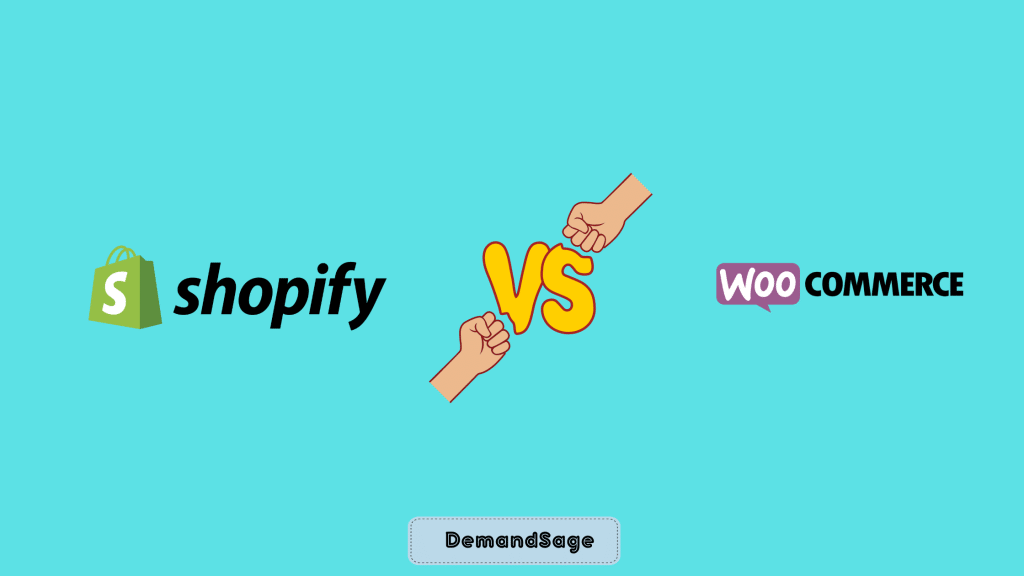Should You Choose Shopify or Woocommerce As The Independent E-commerce Staion?
Jayson 06 Feb 2024 09:59ENCopy link & title
Shopify has become extremely popular in the past two years. Everyone is doing Shopify, but many people also choose another one, Woocommerce. So a question arises, Shopify? Woocommerce? Which one to choose?

In fact, there is no absolutely correct answer, only careful choices after weighing. If you are still hesitant, read my article to find some basis for you.
As for what each of them is, I don't want to say more. I will briefly mention Shopify, a simple and easy-to-use online store-building platform, and Woocommerce. Just understand it as a plug-in in WordPress.
1. Cost: Building a website platform costs money, and different tools charge different fees.
Shopify's basic monthly features cost $39/month, which is perfect for most people. You can also purchase a domain name with Shopify for $14/year. Overall, this means you only need $53 to open a store on Shopify.
Woocommerce is free on the surface, but there are a lot of things you need to purchase, including hosting and a domain name. For hosting, a cheap hosting domain name can cost around $50 per year.
So this round is considered to be Woocommerce's victory for the time being!
Score: Shopify VS Woocommerce 0:1

2. Difficulty of getting started: Some website-building platforms are fool-proof operations, and some website-building platforms require a certain learning curve.
It is extremely easy to build an e-commerce website with Shopify and it is very convenient to operate. This is mainly because Shopify is designed to make e-commerce stores easy to create, and every theme offered is built around e-commerce websites.
Woocommerce is a little more difficult. It is a plug-in for WordPress. WordPress is an open-source platform and is more difficult to get started.
Reconstruct an e-commerce website with a Woocommerce plug-in. Sometimes you add a lot of plug-ins to WordPress but they are incompatible with each other. Then your website structure will have problems, and it will be difficult for novices to solve similar problems.
So if you are a novice and don’t know anything about building a website, I still recommend saving time, spending some money, and opening a Shopify store directly.
Shopify wins this round!
Score: Shopify VS Woocommerce 1:1

3. Payment methods: It should support multiple payment methods
Shopify has its own payment solution (Shopify Payments powered by Stripe), as well as all popular third-party payment gateways.
The downside is that Shopify charges an additional 2% fee for every transaction made through a third-party payment gateway.
You can reduce fees by up to 0.5% by subscribing to the $299/month premium Shopify plan.
Using Shopify Payments requires a flat credit card fee and no other transaction fees. Rates start at 2.9% + 30 cents for the basic plan, and other plans have lower credit card rates.
WooCommerce offers PayPal and Stripe payments by default, and since there are no barriers to entry, any payment company can create add-ons for WooCommerce and provide support.
You can save a lot of money using WooCommerce if you choose your own merchant account and use a third-party gateway. But if you are a small store and are willing to use Shopify Payments, then there is no difference.
This round is a draw
Score: Shopify VS Woocommerce 2:2

4. Applications: Number of third-party application plug-ins and services supported
Shopify comes with a powerful API and an app store with 4,000+ apps. Whether it is promotion, payment, marketing, lead generation, etc., you can find solutions in the app store.
His app store contains free and paid apps, and the charging model is generally a monthly subscription.
WooCommerce has more than 55,000 free WordPress plug-ins and more paid plug-ins to meet a series of functions such as payment, promotion, SEO, etc.
WooCommerce plug-ins are easier to customize, and users with web development experience will find it easier to integrate more personalized plug-ins compared to Shopify.
WooCommerce narrowly won this round
Score: Shopify VS Woocommerce 2:3

5. Scalability: As the traffic of independent stations increases, the website-building platform can be expanded upward.
Shopify can handle all deployments, so users don't need to worry about performance, security, and scalability. When your business grows, you only need to subscribe to the more advanced Shopify Plus plan.
Most importantly, users do not need to hire a dedicated technical team to maintain the daily operation and maintenance of the online store.
WooCommerce is a self-hosted platform that requires users to maintain updates, backups, and security of the website themselves.
When your traffic grows, you must choose a premium server. Since you have complete control over the online store, you can manage resources, cache, etc.
Although WooCommerce provides the most complete control, there are also risks and high development and operation, and maintenance costs.
Shopify wins this round
Score: Shopify VS Woocommerce 3:3

6. Customer service support: More considerate and effective pre-sales, during and after-sales services
Shopify offers 24/7 support via live chat, phone, email, and Twitter.
Since WooCommerce is an open-source solution, the customer service support capabilities are naturally not comparable to Shopify.
Shopify wins this round
Final score: Shopify VS Woocommerce 4:3

Although Shopify seems to be the winner, I am only providing you with a basis for choice. The choice is yours. No matter what platform you choose to build your independent station, you must make it based on your future planning direction.

In fact, there is no absolutely correct answer, only careful choices after weighing. If you are still hesitant, read my article to find some basis for you.
As for what each of them is, I don't want to say more. I will briefly mention Shopify, a simple and easy-to-use online store-building platform, and Woocommerce. Just understand it as a plug-in in WordPress.
1. Cost: Building a website platform costs money, and different tools charge different fees.
Shopify's basic monthly features cost $39/month, which is perfect for most people. You can also purchase a domain name with Shopify for $14/year. Overall, this means you only need $53 to open a store on Shopify.
Woocommerce is free on the surface, but there are a lot of things you need to purchase, including hosting and a domain name. For hosting, a cheap hosting domain name can cost around $50 per year.
So this round is considered to be Woocommerce's victory for the time being!
Score: Shopify VS Woocommerce 0:1

2. Difficulty of getting started: Some website-building platforms are fool-proof operations, and some website-building platforms require a certain learning curve.
It is extremely easy to build an e-commerce website with Shopify and it is very convenient to operate. This is mainly because Shopify is designed to make e-commerce stores easy to create, and every theme offered is built around e-commerce websites.
Woocommerce is a little more difficult. It is a plug-in for WordPress. WordPress is an open-source platform and is more difficult to get started.
Reconstruct an e-commerce website with a Woocommerce plug-in. Sometimes you add a lot of plug-ins to WordPress but they are incompatible with each other. Then your website structure will have problems, and it will be difficult for novices to solve similar problems.
So if you are a novice and don’t know anything about building a website, I still recommend saving time, spending some money, and opening a Shopify store directly.
Shopify wins this round!
Score: Shopify VS Woocommerce 1:1

3. Payment methods: It should support multiple payment methods
Shopify has its own payment solution (Shopify Payments powered by Stripe), as well as all popular third-party payment gateways.
The downside is that Shopify charges an additional 2% fee for every transaction made through a third-party payment gateway.
You can reduce fees by up to 0.5% by subscribing to the $299/month premium Shopify plan.
Using Shopify Payments requires a flat credit card fee and no other transaction fees. Rates start at 2.9% + 30 cents for the basic plan, and other plans have lower credit card rates.
WooCommerce offers PayPal and Stripe payments by default, and since there are no barriers to entry, any payment company can create add-ons for WooCommerce and provide support.
You can save a lot of money using WooCommerce if you choose your own merchant account and use a third-party gateway. But if you are a small store and are willing to use Shopify Payments, then there is no difference.
This round is a draw
Score: Shopify VS Woocommerce 2:2

4. Applications: Number of third-party application plug-ins and services supported
Shopify comes with a powerful API and an app store with 4,000+ apps. Whether it is promotion, payment, marketing, lead generation, etc., you can find solutions in the app store.
His app store contains free and paid apps, and the charging model is generally a monthly subscription.
WooCommerce has more than 55,000 free WordPress plug-ins and more paid plug-ins to meet a series of functions such as payment, promotion, SEO, etc.
WooCommerce plug-ins are easier to customize, and users with web development experience will find it easier to integrate more personalized plug-ins compared to Shopify.
WooCommerce narrowly won this round
Score: Shopify VS Woocommerce 2:3

5. Scalability: As the traffic of independent stations increases, the website-building platform can be expanded upward.
Shopify can handle all deployments, so users don't need to worry about performance, security, and scalability. When your business grows, you only need to subscribe to the more advanced Shopify Plus plan.
Most importantly, users do not need to hire a dedicated technical team to maintain the daily operation and maintenance of the online store.
WooCommerce is a self-hosted platform that requires users to maintain updates, backups, and security of the website themselves.
When your traffic grows, you must choose a premium server. Since you have complete control over the online store, you can manage resources, cache, etc.
Although WooCommerce provides the most complete control, there are also risks and high development and operation, and maintenance costs.
Shopify wins this round
Score: Shopify VS Woocommerce 3:3

6. Customer service support: More considerate and effective pre-sales, during and after-sales services
Shopify offers 24/7 support via live chat, phone, email, and Twitter.
Since WooCommerce is an open-source solution, the customer service support capabilities are naturally not comparable to Shopify.
Shopify wins this round
Final score: Shopify VS Woocommerce 4:3

Although Shopify seems to be the winner, I am only providing you with a basis for choice. The choice is yours. No matter what platform you choose to build your independent station, you must make it based on your future planning direction.


